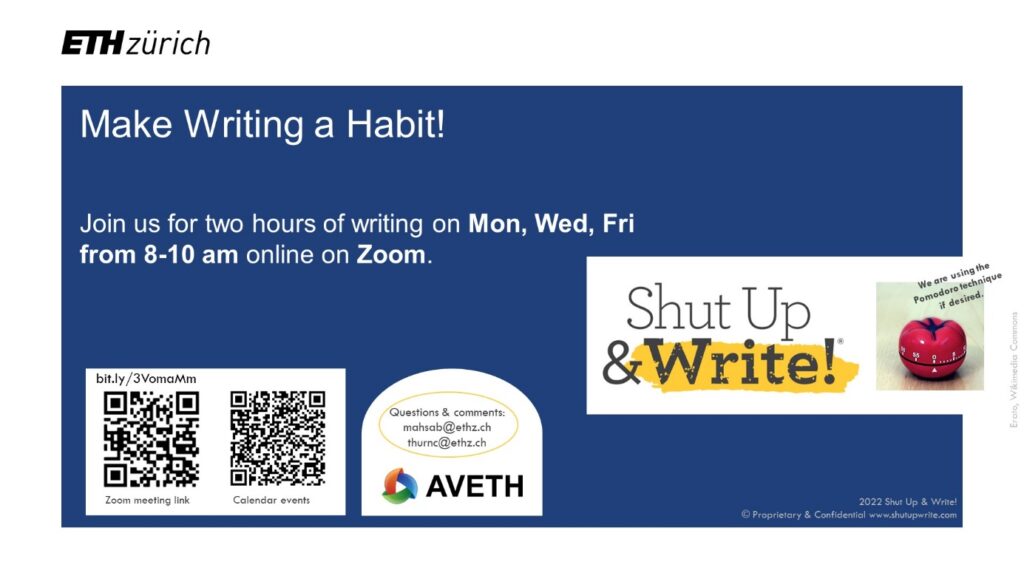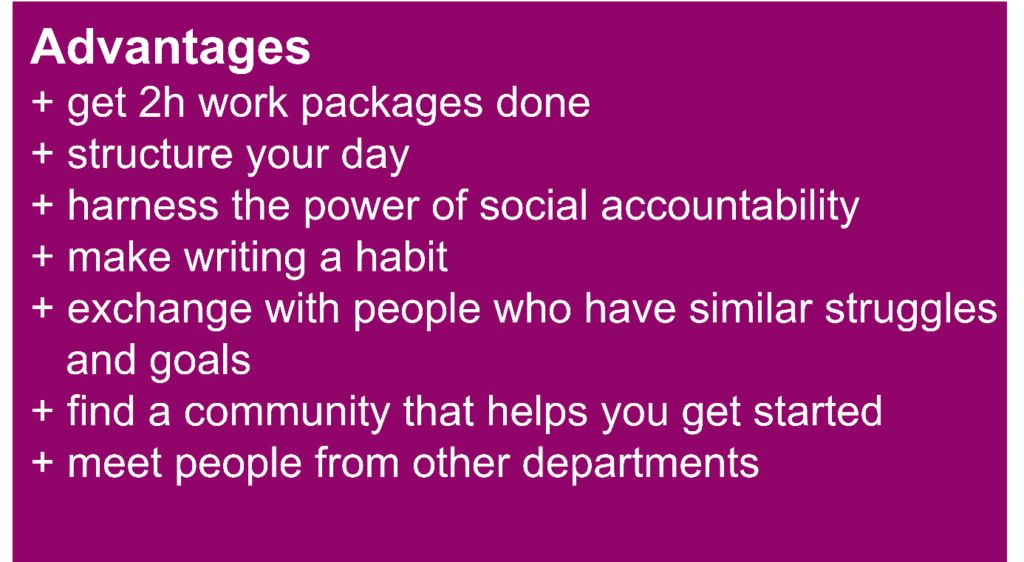
Summary / Tl;dr (Too long; didn’t read)
- The AVETH Shut Up and Write sessions take place each Monday, Wednesday, and Friday from 8-10.
- You can join whenever you want during the session, and work on whatever you want
- A regular schedule and social accountability will help you to get 2h work packages done
Why is AVETH organizing Shut Up and Write sessions?
Research findings need to go out into the world, and therefore academic research is a writing profession. Yet, many doctoral students, postdocs, and professors are unhappy with their amount of writing (Ramsden, 1994; Sarnecka, 2021). Key barriers to academic writing are feeling not ready to write and having other priorities. Key tips to cope with such barriers are distributed writing (Gardiner & Kearns, 2011; Sarnecka, 2021)—instead of binge writing, and social accountability (Breitenstein, 2021; Sarnecka, 2021).
Distributed Writing revolves around the idea that researchers usually don’t have large amounts of time, as they have teaching duties, meetings, lab work or fieldwork, conferences, courses, etc. throughout the day. Thus, writing can sometimes get a lower priority than it should have. In such cases, snack writing of 45 minutes to 2 hours per day is a highly efficient strategy to boost your writing and having a regular writing schedule such as the one that AVETH Shut Up and Write uses can help to make distributed writing a habit. We believe the periodic event is essential because it helps you to continue the work from the last session without a long interruption.
Social Accountability and peer support are effective factors in goal-pursuit such as writing more often and longer (Breitenstein, 2021; Skrapuski & Foucher, 2018). AVETH Shut Up and Write offers such social accountability by meeting people regularly for a defined period, talking about one’s goal, and then working silently beside each other. This method can also work in real life, for example when you are studying in a library such as the ETH library.
How does it work?
We meet every Monday, Wednesday, and Friday (except on holidays) from 8:00 am to 10:00 am at this Zoom-link: https://ethz.zoom.us/j/62799231125.
We make use of the 25/5 Pomodoro technique, that is, we work for 25 minutes followed by a 5-minute break: At 8:00 am we quickly have a check-in (how is everyone, how do we want to organize the session, what is everyone trying to achieve during the upcoming session, does someone need to leave earlier) and then everyone turns their camera and microphone off for 25 minutes of writing. Still, the fact that others are in the Zoom meeting helps to create some little “peer pressure” situation. And the breaks are something to look forwards to.
At 8:30h, 9:00h, and 9:30h we meet for a short 5-minute break and talk about each other’s projects, ask questions (about writing or about something very different), and share experiences. This creates quite a welcoming and friendly atmosphere. We also discuss problems and solutions during the breaks. At 10:00 we say goodbye to each other.
You are free to use these two hours however you want. Many people are writing their theses, an article, or a conference abstract, but people were also designing their thesis covers or writing job applications in this period. It will help you to finish any work package that takes about 2 h or less (What is a work package? A work package is the smallest portion of the larger project. As mentioned above, this can be anything you need to work on currently).
The list below shows all the advantages that you can get from joining the Shut Up and Write sessions regularly. So why not try it out? You have nothing to lose 🙂

The only negative aspect that we could find about these Shut Up and Write sessions was that it starts at 8:00 am, which is very early for many people. However, it is important to keep in mind, that you are free to join the session whenever you want, so joining at 8:30 or 9:00 is no problem at all.
Some tips for your well-being
Getting started is a big struggle for many writers. The so-called white page syndrome prevents people from putting anything on paper. Especially among researchers who are often perfectionists, this syndrome is frequent. We have the impression, that perfectionism is even more expressed at ETH, where excellence is valued so high.
“The first draft of everything is shit” (Ernest Hemingway). What Hemingway conveys with this quote is that it is unreasonable to assume that the first draft will be perfect, and that perfectionism only prevents progress. Thus, it is better to start a text knowing that it will be imperfect, and then, later, edit it with the goal to improve it. In this respect also some early feedback from colleagues on the text is very valuable. Don’t be shy to ask people about their opinion. Also talking about struggles and problems can be helpful, firstly because hearing that everyone struggles from time to time can be a relieving thought, and secondly because others might have gone through the same problems and might have developed clever solutions for that (such as the Pomodoro technique and Shut Up and Write sessions). Thus, instead of aiming to produce the perfect first draft, a better approach to writing good texts is the following heuristic: “Write without fear. Edit without mercy”.
Furthermore, it is important to not be overly critical and strict with yourself. When you don’t make it a couple of times to the Shut Up and write session, people tend to think “Oh I didn’t make it to the last sessions, these things don’t work, I can’t do it” whereas some others tend to think “Oh I missed the last sessions, now I have to work twice as hard to catch up”. Both are harmful attitudes. It is healthier to acknowledge that we are all human, and humans are no machines. Or as Sarnecka (2021) puts it:
“When a tomato plant isn’t producing tomatoes, a gardener doesn’t say, “Shame on you for being unproductive! No more water for you until you produce a tomato!” Instead, the gardener looks for ways to enrich the soil and take care of the plant better. This is the most important implication (…)—when you are unproductive, the solution is to treat yourself better, not worse.” (p. 72)
In addition to these tips, a piece of general advice on structuring your day: Don’t read e-mails first thing in the morning. Turn off your push notifications about new e-mails at least. Even better: set specific e-mail answering windows for time periods when your energy is low (e.g., after lunch or in the evening). Turn off your e-mail program for the rest of the time. Interested in getting more inspiration on how to structure your day best? Then join us for the Shut Up and Write sessions and exchange with other writers who likely share the same struggles as you do.
Further reading
If you want to read more, we found two books especially useful: Time for Research by Hugh Kearns & Maria Gardiner (https://www.ithinkwell.com.au/bookshop/time-for-research); and The Writing Workshop by Barbara Sarnecka (https://osf.io/5qcdh/—freely available). These two books are helpful not only with regard to time management but also with well-being, as they discuss various sources of stress and how to deal with them in academia.
The ETH library also has interesting offers such as writing advice to get support in the content-related topics of your academic writing.
And here is a list of further reading for those who are interested:
Breitenstein, S. M. (2021). Why and how to start a writing accountability group. Nurse Author & Editor, 31(3-4), 54-57.
Cepeda, N. J., Pashler, H., Vul, E., Wixted, J. T., & Rohrer, D. (2006). Distributed practice in verbal recall tasks: A review and quantitative synthesis. Psychological bulletin, 132(3), 354.
Delaney, P. F., Verkoeijen, P. P., & Spirgel, A. (2010). Spacing and testing effects: A deeply critical, lengthy, and at times discursive review of the literature. Psychology of learning and motivation, 53, 63-147.
Gardiner, M., & Kearns, H. (2011). Turbocharge your writing today. Nature, 475(7354), 129-130.
Kearns, H., & Gardiner, M. (2020). But I’m not ready! Common barriers to writing and how to overcome them. Impact of Social Sciences Blog.
Levecque, K., Anseel, F., De Beuckelaer, A., Van der Heyden, J., & Gisle, L. (2017). Work organization and mental health problems in PhD students. Research policy, 46(4), 868-879.
Ramsden, P. (1994). Describing and explaining research productivity. Higher education, 28(2), 207-226.
Sarnecka, B. W. (2021). The Writing Workshop: Write More, Write Better, Be Happier in Academia (2nd ed.). Author. https://osf.io/5qcdh/
Skarupski, K. A., & Foucher, K. C. (2018). Writing accountability groups (WAGs): A tool to help junior faculty members build sustainable writing habits. The Journal of Faculty Development, 32(3), 47-54.
